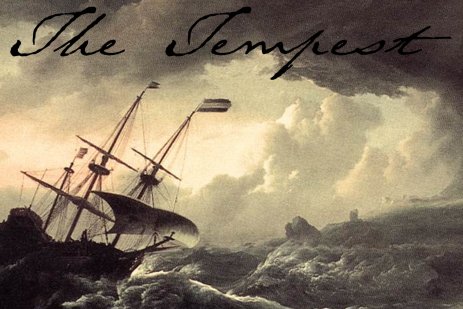Lt. Commander Alexander Falconer, a naval officer during World War II and a professional sailor steeped in the history of seamanship and navigation, published two books that were largely ignored at the time: Shakespeare and the Sea (1964) and A Glossary of Shakespeare’s Sea and Naval Terms including Gunnery (1965). Falconer brings firsthand knowledge and experience to an investigation of Shakespeare’s use of seafaring terms and situations involving the sea. He concludes that the poet-dramatist possessed detailed, accurate knowledge of naval matters and was well informed about storms, shipwrecks, pirates, voyages of exploration, and navigation:
Falconer notes that in the opening scene of The Tempest, when the ship is wrecked in a storm, Shakespeare took care for details. He “worked out a series of maneuvers” and “made exact use of the professional language of seamanship.”
When the Royal Shakespeare Company presented a “shipwreck trilogy” of Shakespeare plays (The Tempest, Twelfth Night and The Comedy of Errors), Charles Spencer of The Telegraph observed that “although there were books on navigation in Shakespeare’s time, nothing on seamanship was published until later.” Indeed, Falconer believed the Bard’s knowledge in this area could not have come from books alone.
“Most current scholarship fails to note the sophistication of Shakespeare’s maritime imagination,” writes Dan Brayton in Shakespeare’s Ocean (2012), noting “the extraordinary degree [in the poems and plays] to which human lives are connected with the sea, or the remarkable specificity of his descriptions of marine phenomena.”
The author’s exact use of naval and maritime language, along with his intimate knowledge of the sea and seamanship, cannot be explained by anything in the documented life of the man from Stratford. It is sheer fantasy to think he might have been a sailor during his “lost” years, and the same goes for supposing he was a schoolteacher or a law clerk. Meanwhile scholars generally fail to notice the Bard’s experience at sea because they know the Stratford man never once left dry land. When one assumes that it’s impossible for something to exist, it becomes quite easy — even necessary — to ignore it.
“Closed minds automatically blockade new information which conflicts with their own beliefs, preventing highly persuasive evidence from entering their brains for evaluation,” writes Paul Altrocchi, adding, “Oxfordians believe with conviction that Stratfordianism represents a classic example of the common human tendency to stick tenaciously with conventional wisdom, preventing much more logical and coherent newer theories and facts from being given a fair hearing.”
When we turn to the life of Edward de Vere, Earl of Oxford, however, there is no need to “imagine” his experience with the sea and, importantly, there is no longer any reason to ignore the vast knowledge of the sea to be found in the poems and plays.
Oxford was twenty-two in September 1572 when he wrote to Burghley, in reaction to the St. Bartholomew’s Day Massacre of Protestants in France, offering to help defend England in any way he could. “If there be any setting forth to sea, to which service I bear most affection,” he wrote, “I shall desire your Lordship to give me and get me that favor…”
Eventually the earl traveled extensively by ship or boat. He crossed the Channel to France in 1575 and took many trips on canals and other waterways between Italian cities, with Venice as his home base.
In the autumn of 1575 it was reported that Oxford had hurt his knee in a Venetian galley. While returning to England in April 1576, he was captured by pirates in the Channel and nearly killed.
In 1585 he crossed by ship over to the Netherlands on a military mission; this time pirates stopped the vessel that was returning his belongings to England and apparently stole everything on board. Earlier the earl had invested (disastrously) in Martin Frobisher’s voyages to discover the Northwest Passage to China, which involved varied and challenging aspects of navigation. He was well acquainted with Dr. John Dee, who was intimately involved in developing Frobisher’s navigational routes.
In June 1588, with the Spanish Armada on its way, Oxford was one of many nobles who sought to rent or hire a ship to enter the fight.
In the following year, a poem, apparently by Oxford’s secretary Lyly, envisioned the earl standing on the hatch-cover of a ship, literally breathing fire instilled within him by Pallas, the spear-shaker:
De Vere … like warlike Mars upon the hatches stands.
His tusked Boar ‘gan foam for inward ire
While Pallas filled his breast with fire.
Shakespeare and the Sea was reviewed in the autumn 1965 edition of the Shakesperean Authorship Review by I.L.M. McGeoch, who writes: “Professor Falconer points out that whereas many educated Elizabethans understood the art of navigation – in those happy days art was science, and science was art – only those who actually served at sea could acquire a profound knowledge of the practice of seamanship and the correct meaning and use of the terms proper to the working of ships. That Shakespeare possessed such a profound knowledge is instanced many times.”
As an excellent example of “inspired accuracy of allusion seasoned with wit,” he offers a line from King John (4.2): “And like a shifted wind unto a sail, it makes the course of thoughts to fetch about,” and further observes:
“Tacking is to bring a ship’s head to lie the other way,” McGeoch noted. “True. And ‘to fetch about’ is synonymous with ‘to tack’; but subtler still is the reference to ‘course,’ which is not only the direction in which a ship is heading, but also the name given to the principal sail on any mast of a square-rigged ship. The essence of tacking, therefore, is to bring the wind onto the other side of the sail, or ‘course,’ and the necessary re-trimming of the sail is assisted by the wind blowing upon it from the side appropriate to the new tack.”
“Not knowing that Edward de Vere wrote the great plays of Shakespeare makes it impossible to understand many of the allusions and subtleties within every play,” Dr. Altrocchi writes, adding that this impossibility “deprives the audience of much of a play’s texture.”
[This reason is now Number 60 in the book 100 Reasons Shake-speare was the Earl of Oxford, edited by Alex McNeil, to whom I am always grateful, and given additional editorial assistance from Brian Bechtold.]



